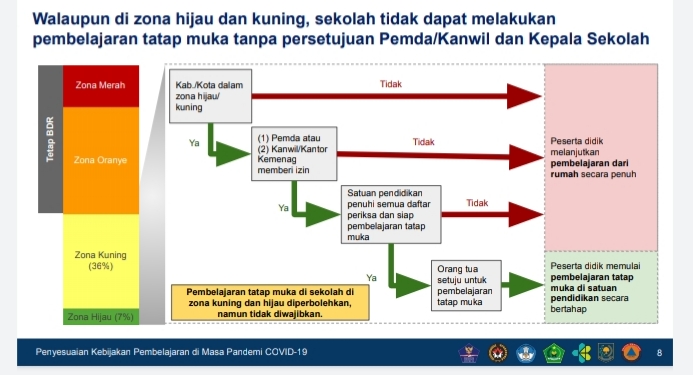Face-to-Face Learning Need Permission from Regional Gov’t, Parents

Presentation of Minister of Education and Culture on Conditions to Reopen Schools.
Schools located in green and yellow zones cannot necessarily start face-to-face learning, according to Minister of Education and Culture Nadiem Makarim.
“Even though they are located in the green and yellow zones, schools cannot start face-to-face learning without the approval of the local government/education and culture service, the school principal, and the parent/guardians of students,” Nadiem told Communication Team of the Working Committee for COVID-19 and National Economic Recovery, in Jakarta, Saturday (8/8).
“If parents do not agree the students to return to school, the students must continue school from home,” the Minister added.
Nadiem went on to say that face-to-face learning will be carried out in stages with the requirement of 30-50% of student capacity per class.
“From the initial standard, it is 28-36 students per class to 18 students. For special schools, the range is between 5-8 students to 5 students per class. For early childhood schools, from initially 15 students per class to 5 students,” said Nadiem.
Likewise, according to Nadiem, the number of days and hours of study will also be reduced, with a shift system determined by each educational unit according to the situation and needs.
However, if the corona cases rise in the school area, Nadiem stressed that the regional government is obliged to close the school again.
“The implementation and evaluation of face-to-face learning is the responsibility of the regional government supported by the Central Government. The Education Office, Provincial or District / City Health Office, together with Head of the Education Unit are obliged to coordinate continuously with the COVID-19 Task Force to monitor the level of risk of COVID-19 in the regions,” said Nadiem.
Responding to the large number of education units in the 3T (Frontier, Outermost, Disadvantaged) areas that have great difficulty implementing distance learning due to lack of access, Nadiem said that this could have a permanent negative impact on children’s development and psychosocial aspects.
“Currently, 88% of the total 3T areas are in the yellow and green zones. With this policy adjustment, educational units which are ready and willing to carry out face-to-face learning have the option to implement it in stages with very strict health protocols,” Nadiem said. (Communication Team of the COVID-19 Working Committee and National Economic Recovery/EN)
Translated by: Estu Widyamurti
Reviewed by: M. Ersan Pamungkas








